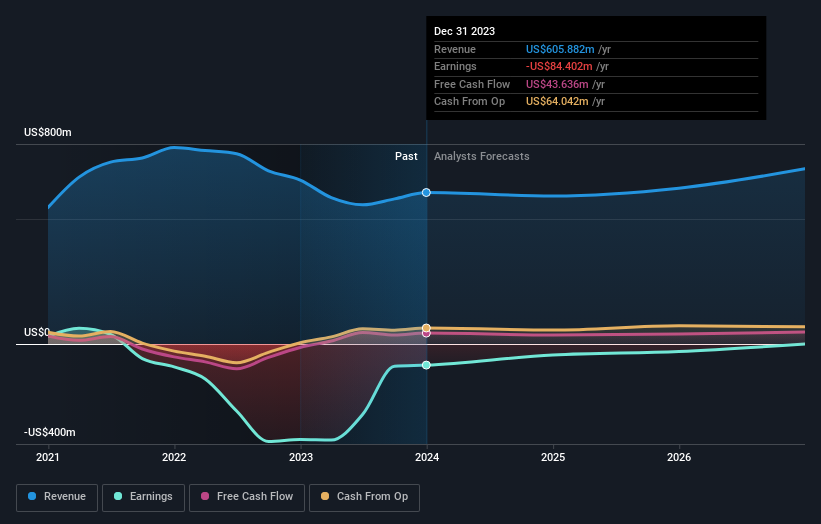- United States
- /
- Consumer Durables
- /
- NYSE:COOK
Analysts Have Been Trimming Their Traeger, Inc. (NYSE:COOK) Price Target After Its Latest Report

Traeger, Inc. (NYSE:COOK) shareholders are probably feeling a little disappointed, since its shares fell 8.5% to US$2.04 in the week after its latest yearly results. Revenues came in at US$606m, in line with expectations, while statutory losses per share were substantially higher than expected, at US$0.68 per share. Following the result, the analysts have updated their earnings model, and it would be good to know whether they think there's been a strong change in the company's prospects, or if it's business as usual. So we collected the latest post-earnings statutory consensus estimates to see what could be in store for next year.
See our latest analysis for Traeger

After the latest results, the consensus from Traeger's ten analysts is for revenues of US$592.2m in 2024, which would reflect a discernible 2.3% decline in revenue compared to the last year of performance. Losses are predicted to fall substantially, shrinking 35% to US$0.43. Yet prior to the latest earnings, the analysts had been forecasting revenues of US$606.2m and losses of US$0.37 per share in 2024. While this year's revenue estimates dropped there was also a notable increase in loss per share expectations, suggesting the consensus has a bit of a mixed view on the stock.
The consensus price target fell 18% to US$3.29, with the analysts clearly concerned about the company following the weaker revenue and earnings outlook. The consensus price target is just an average of individual analyst targets, so - it could be handy to see how wide the range of underlying estimates is. The most optimistic Traeger analyst has a price target of US$4.50 per share, while the most pessimistic values it at US$2.00. Note the wide gap in analyst price targets? This implies to us that there is a fairly broad range of possible scenarios for the underlying business.
Another way we can view these estimates is in the context of the bigger picture, such as how the forecasts stack up against past performance, and whether forecasts are more or less bullish relative to other companies in the industry. We would also point out that the forecast 2.3% annualised revenue decline to the end of 2024 is better than the historical trend, which saw revenues shrink 5.2% annually over the past three years Compare this against analyst estimates for companies in the broader industry, which suggest that revenues (in aggregate) are expected to grow 5.1% annually. So it's pretty clear that, while it does have declining revenues, the analysts also expect Traeger to suffer worse than the wider industry.
The Bottom Line
The most important thing to take away is that the analysts increased their loss per share estimates for next year. On the negative side, they also downgraded their revenue estimates, and forecasts imply they will perform worse than the wider industry. The consensus price target fell measurably, with the analysts seemingly not reassured by the latest results, leading to a lower estimate of Traeger's future valuation.
Following on from that line of thought, we think that the long-term prospects of the business are much more relevant than next year's earnings. At Simply Wall St, we have a full range of analyst estimates for Traeger going out to 2026, and you can see them free on our platform here..
That said, it's still necessary to consider the ever-present spectre of investment risk. We've identified 3 warning signs with Traeger , and understanding them should be part of your investment process.
Valuation is complex, but we're here to simplify it.
Discover if Traeger might be undervalued or overvalued with our detailed analysis, featuring fair value estimates, potential risks, dividends, insider trades, and its financial condition.
Access Free AnalysisHave feedback on this article? Concerned about the content? Get in touch with us directly. Alternatively, email editorial-team (at) simplywallst.com.
This article by Simply Wall St is general in nature. We provide commentary based on historical data and analyst forecasts only using an unbiased methodology and our articles are not intended to be financial advice. It does not constitute a recommendation to buy or sell any stock, and does not take account of your objectives, or your financial situation. We aim to bring you long-term focused analysis driven by fundamental data. Note that our analysis may not factor in the latest price-sensitive company announcements or qualitative material. Simply Wall St has no position in any stocks mentioned.
About NYSE:COOK
Traeger
Designs, sources, sells, and supports wood pellet fueled barbecue grills and pellet fueled barbecue grills for retailers, distributors, and direct to consumers in the United States and internationally.
Undervalued with mediocre balance sheet.
Similar Companies
Market Insights
Community Narratives



